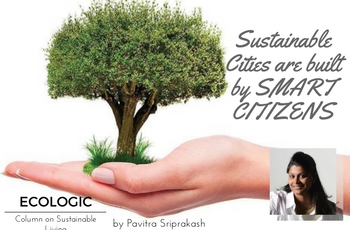15 Apr 2017, New Indian Express: ECOLOGIC- Pavitra Sriprakash, the Chief Designer and Director of Shilpa Architects writes about holistic sustainability, reciprocity as a paradigm in Urban Design and the upcoming Reciprocity Fest!
Read Full Article: PDF | Link to New Indian Express Site | Full Text (below)
| Sustainable cities are built by smart citizens
Urbanisation is the new Globalisation! With more than half the world already living in cities, this number is expected to shoot up to two thirds by 2050. Seventy per cent of greenhouse gas emissions and two-thirds of the world’s overall energy consumption are by cities and urban centers. With such unprecedented growth, efforts to build livable and sustainable cities are hampered by several challenges in areas such as water supply and sanitation, waste management, transport infrastructure and services, energy, jobs, education, health, food security, safety and climate change.The Global Agenda Council of the World Economic Forum proposed the Reciprocal Design Index (RDI) in 2012. Sheila Sri Prakash, a leading member of this Council defines Holistic Sustainability as ‘Reciprocity,’ which will emerge as the new paradigm for Urban Design and Architecture. Reciprocity can be defined as the practice of exchanging things with others for mutual benefit. It has special meaning in its application of planet-friendly measures as there are two stakeholders at play — the earth and her resources, and all creatures that call the earth their Home. Urban Design indicators synthesized with components of the Human Development Index serves as a measure for reciprocity. Many institutions, and behemoths world over have since cloned variants to enable policy makers, authorities, professionals, academics and financial institutions to evaluate and monitor development plans; or compare and rank the livability of cities. The World Bank estimates that building and maintaining these sustainable cities of the future will run up bills of $4.5 trillion (`300 lakh crore) and such spending will continue till 2050 till every city reaches this goal. Such mind numbing numbers compels one to abjectly throw up their hands and ask the question: how can my individual effort towards sustainability ever matter? The Global Commons or poromboke are the ecosystems, biomes and processes which regulate the stability and resilience of planet Earth.These Commons are the ones that often face over-exploitation and rapid degradation in urban scenarios. Strategies to preserve these Commons will require focused micro efforts to check and manage major transformations. A bottom-up ground swell propelled by citizens’ involvement will synergize deep changes when combined with top down mandates of governments. Institutions may frame policies for smart cities, but only with wholesome participation of people can these initiatives succeed. It is time you and I took ownership of these “poromboke” lands in our everyday lives these are areas like our streets and municipalities. If you segregate waste at home; keep areas besides waste bins and storm water drains clean, remove billboards from trees and write their botanical names; if you persuade apartment associations to conserve water, install and maintain sewage treatment plants; if you participate in campaigns to reclaim lakes, clean up river fronts and beaches; if you teach children to choose right foods, learn a craft, save a turtle; if, if, IF….. Every such humble act reciprocates immeasurably to earth and humanity! So be proactive, participate and network to share experiences with likeminded people in common forums, or at festivals that preserve culture and heritage. The upcoming Reciprocity Fest celebrating World Earth Day (April 22-23) is happening right in our backyard. It is your turn as a responsible citizen to show your commitment to our city’s global commons. Get your hands dirty, engage to solve and not berate; because only smart citizens make smart cities. |



